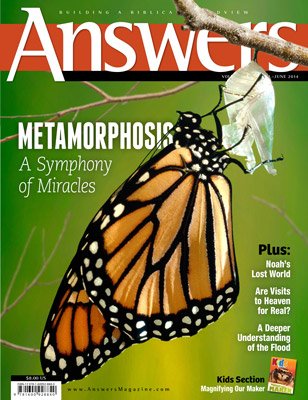Bird-Saving Spider Webs
Design in Nature
A bird’s best friend—that’s not normally said about spiders. But the orb weaver has a unique “stay away” warning system that has inspired new technology to save birds’ lives.
Have you ever heard the thump of a confused bird hitting a window? Countless birds are killed each year when they fly directly into window glass. Sometimes they can’t see the glass panes that are nearly invisible to them, or they get confused by reflections of nearby trees, sky, or the birds themselves. To address this problem, researchers have turned to an unusual corner of nature: spider webs.
Spiders, such as the orb weaver—whose spoke-wheel webs appear frequently in yards and woods—construct their webs with a silk that reflects ultraviolet light. Our eyes can’t see ultraviolet light, but many insects and birds do. The UV-reflecting property of spider silk appears to serve two purposes. First, the ultraviolet image may attract insects to the web like a neon advertising sign. Some spiders actually arrange the UV-reflective coating on their webs with flower-like patterns to draw in and trap pollinating insects.1 A second web purpose, of particular interest here, is to warn birds to avoid striking the web and interfering with the spider’s efforts to capture small prey.
The Arnold Glass Company produces bird-friendly glass called ORNILUX.2 The surface of this glass has a criss-cross pattern of UV-reflecting stripes. This film coating is invisible to people but readily seen by birds. To test the effectiveness of the treated glass, two panels were placed side-by-side in a laboratory flight tunnel. One panel held ordinary glass (protected with netting) while the other had the UV-reflecting stripes. Researchers released birds into the tunnel and observed their flight paths. In the experiment, the birds made obvious efforts to avoid the UV-treated glass, reducing potential collisions by an estimated two-thirds.3
Similar to birds, many sea creatures also are sensitive to ultraviolet light. So it may be possible to design fish nets that are visible to other species that fishermen don’t want to become accidentally entangled in the nets.
The eyes of many creatures see things outside the range of human vision. Understanding and applying ultraviolet technology is helping us manage and protect wildlife. In this particular case, spider webs led the way to safety for birds. Nature is filled with such design ideas. These ideas did not arise by chance or slow improvements. Instead God implemented them at creation to glorify Him and to inspire us in our exploration and application of His wise designs.
Answers Magazine
April – June 2014
A closer look at the Genesis Flood account reveals a beautifully written, unified narrative that points to one inspired author. The passage masterfully highlights one central message: “God remembered Noah.” Along with in-depth articles on the Flood, this issue shows biblical and historical evidences of Christ’s Resurrection, new discoveries about the miracle of a butterfly’s metamorphosis and much more!
Browse IssueFootnotes
- Catherine Craig and Gary Bernard, “Insect Attraction to Ultraviolet-Reflecting Spider Webs and Web Decorations,” Ecology 71(2): 616–623. This claim is disputed by some, such as S. Zschokke, “Ultraviolet Reflectance of Spiders and Their Webs,” Journal of Arachnology 30 (2002): 246–254.
- ORNILUX bird protection glass, ornilux.com.
- http://phys.org/news/2012-08-birds-web-inspired-ornilux-glass.html; see also http://www.bbc.co.uk/news/technology-19206168.
Recommended Resources

Answers in Genesis is an apologetics ministry, dedicated to helping Christians defend their faith and proclaim the good news of Jesus Christ.
- Customer Service 800.778.3390
- Available Monday–Friday | 9 AM–5 PM ET
- © 2026 Answers in Genesis






